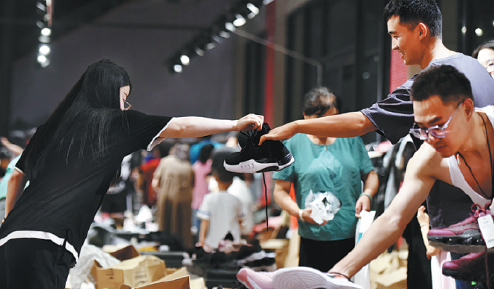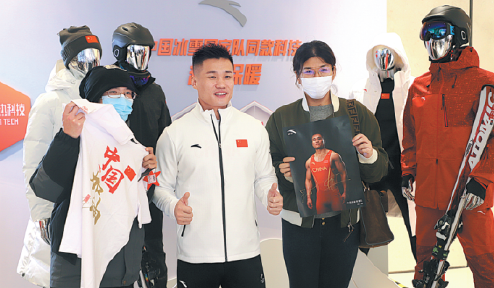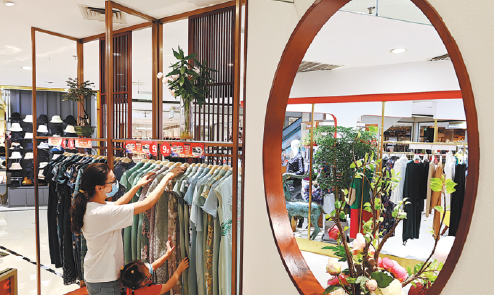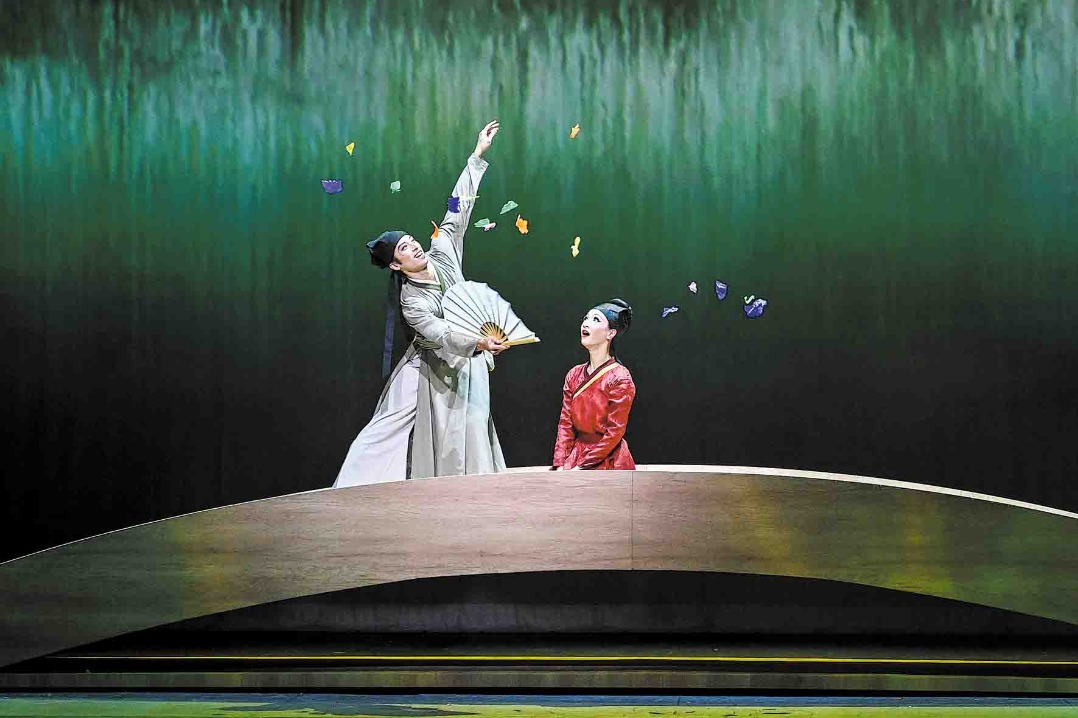'New national products' gain more respect, get new lease on life
The popularity of domestically produced sportswear and fashion items is surging as the country's standing continues to rise globally. Cheng Si reports from Beijing with Hu Meidong in Fuzhou.

After a deliveryman rang his doorbell, Yang Lin opened a package and tried on his new sports shoes made by Warrior, a domestic brand, which he called a "new national product".
"It used to be unacceptable to me to buy sports goods designed or produced on the (Chinese) mainland because of the rustic designs and 'strange' color combinations. I only used to purchase international brands such as Nike and Supreme," the biomedical engineer said.
"I don't know when I got the idea that wearing American or European brands was more fashionable and edgy than buying those made by domestic companies," the 25-year-old said.
"It was a sense of superiority, but somehow stupid. I see that now."
He said that he changed his opinion last year when famous brands, including H&M, Nike and Uniqlo, announced that they would boycott cotton from the Xinjiang Uygur autonomous region after media stories overseas alleged that it had been produced by the use of "forced labor".
"With the standoff growing in intensity, these brands' ridiculous behavior has enraged customers in China, especially the younger generation. My peers started refusing to buy their products, preferring domestic brands such as Anta and Li-Ning instead," Yang said.
"The domestic brands have also improved their designs and released collections in collaboration with fashion brands, which is exciting and makes me want to buy them. It seems that foreign brands such as Nike are not indispensable to my life."
Growing passion
Yang is not alone. In recent years, the younger generation (people born after 1990) has shown a growing passion for, and a stronger desire to buy, domestically made sportswear and cosmetics, along with Chinese designer pieces, which usually highlight elements of traditional culture.
A report released in September by Aurora Information and Technology, a big-data provider and consultancy headquartered in Shenzhen, Guangdong province, showed that about 70 percent of people surveyed who were born after 1990 showed a marked preference for buying domestic products this year.
Domestic brands also saw a good performance during the annual Singles Day online shopping spree last month, with their sales holding up well against international brands on the Tmall platform, an e-marketplace operated by Alibaba.
Tmall's data show that in the 45 minutes after the shopping festival started at 12.01 am on Nov 11, domestic sports brands such as Erke and Warrior each saw their sales exceed 100 million yuan ($15.7 million).
Zheng Hong'e, a professor with the College of Humanities and Development Studies at China Agricultural University, said that while they are inspired by traditional culture, these new national products incorporate a number of state-of-the-art aesthetic and fashionable elements.
She added that the emergence and popularity of these products indicate Chinese people's increasing acceptance of domestic brands, rather than an obsession with foreign ones. "China has gradually shaken off the stereotype of being the world's factory and is reshaping its future into an innovative one," she said.
Liu Xiaoling, a 26-year-old fashion stylist from Beijing, said: "Why not? I mean, why not try Chinese brands, especially sports ones? They are cheaper, but they are high quality. What's important is that they are designed and produced by Chinese people."
She said that previously when her team produced styles for celebrities, she preferred to use European haute couture brands, along with designer items from South Korea and Japan.
"I have to admit that the fashion circle did have a prejudice against Chinese brands, which were usually branded 'countrified' and 'rustic'," she said.
"But in the past few years, Chinese designer and sports brands, highlighting traditional elements, have started to win a good reputation in the fashion industry, especially when Li-Ning appeared at New York Fashion Week in 2019, showing the world that China does have the good design gene."
Future landscape
Long recognized as a manufacturing powerhouse, China, which has a distinct culture and massive consumer market, has benefited from many years of producing goods for foreign brands.
That's because the country's designers have been subconsciously influenced by their clients, which has fed into the rise of new national products, insiders said.
The facts speak for themselves. In the first half year of the year, sales of certain domestic sports brands outstripped some international brands.
In August, for example, Anta Sportswear's first half report showed that revenue had exceeded 22.8 billion yuan, meaning that it had outperformed Adidas, whose revenue in China was about 18.3 billion yuan in the same period.
The company, based in the eastern province of Fujian, has also managed to narrow the gap with Nike, which earned 27.3 billion yuan in the first half according to its own reports.
The new national products boom has also attracted the attention of the central government, which plans to expand the sector into a more innovative industry with higher added value.
Since the 1990s, Fujian has incubated most of the domestic sports brands, such as Anta and Erke.
It has highlighted the development of the sports market in its plan for the next five years, focusing on high-quality manufacturing.
In a plan released in July, it emphasized that the production of cotton, apparel and shoes, especially sports shoes, are key areas that will attract greater official investment in the next five years.
In an interview with Fujian Daily in September, Ding Shizhong, Anta's CEO and chairman of the board of directors, said Chinese civilization and culture provide a sound background for the development of new national products, which have been created with modern technology and new materials.
"It's not vintage fashion, but it carries forward the good parts of the culture and innovation," he said.
Ding added that during the next five years, Anta will invest more than 4 billion yuan in the research and development of sports goods to strengthen its ability to innovate.
"The whole landscape of China's sports market is changing, and Fujian is on the front line of that reformation," he said.
"We've continued to transform our company into a high-tech one from the traditional factory system and helped to push forward the reshaping of the nation's sports market."



Today's Top News
- Unified national market a new growth launchpad
- US deal a structural challenge for Japan
- Industrial prowess of China a subject of serious study
- US new tariffs 'unfair': Experts
- NDRC recalibrating steps to drive growth, boost demand
- Wartime hero's legacy fortifies Sino-UK bond






























